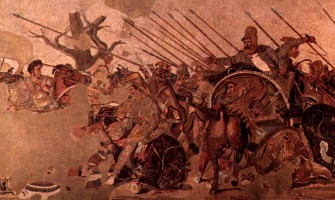 Gumilyov’s book interested me from the very first pages (I started reading it at the top Olympus< /a>). I’ve heard about theories of passionarity and, in principle, guessed what the author would be talking about. But it’s one thing to guess, and it’s quite another to hear for yourself that … an awl in the ass is from God and it can be inherited.The first chapters of the work made me excited. Gumilyov struck not so much with his theories as with the eccentricity of the questions that arose in his head. What is an event? Does history belong to the humanities or natural sciences? And so next.The idea of passionarity turned out to be very close and understandable to me, as endowed with an excess of energy, which simply requires immediate implementation. I feel in myself some fraction of this energy, a spark of passionarity, and I do not hesitate from time to time to inflate it into a huge flame. And I like the idea that my children probably will get a charge of passion.
Gumilyov’s book interested me from the very first pages (I started reading it at the top Olympus< /a>). I’ve heard about theories of passionarity and, in principle, guessed what the author would be talking about. But it’s one thing to guess, and it’s quite another to hear for yourself that … an awl in the ass is from God and it can be inherited.The first chapters of the work made me excited. Gumilyov struck not so much with his theories as with the eccentricity of the questions that arose in his head. What is an event? Does history belong to the humanities or natural sciences? And so next.The idea of passionarity turned out to be very close and understandable to me, as endowed with an excess of energy, which simply requires immediate implementation. I feel in myself some fraction of this energy, a spark of passionarity, and I do not hesitate from time to time to inflate it into a huge flame. And I like the idea that my children probably will get a charge of passion. What exactly causes passionary explosions (mutations, supernovae or solar eclipses) is an interesting question, of course, but I’m much more interested in what stage, according to Gumilyov, the Russian ethnic group is now. In his book, he deliberately does not consider modernity, justifying this with the inevitable distortions of proximity (excessive inclusion of the observer in the observed system). Yes, and the book was written back in the Soviet Union – it is unlikely that this contributed to frankness, Gumilyov was damned bold even without this in his statements regarding Marx’s theories.At the end of the book, the author suffered, he endlessly poured historical examples and analogies, and this slightly loaded my mind. But every cloud has a silver lining – I convinced myself that listening to lectures in a trance state is the most progressive method of studying history.
What exactly causes passionary explosions (mutations, supernovae or solar eclipses) is an interesting question, of course, but I’m much more interested in what stage, according to Gumilyov, the Russian ethnic group is now. In his book, he deliberately does not consider modernity, justifying this with the inevitable distortions of proximity (excessive inclusion of the observer in the observed system). Yes, and the book was written back in the Soviet Union – it is unlikely that this contributed to frankness, Gumilyov was damned bold even without this in his statements regarding Marx’s theories.At the end of the book, the author suffered, he endlessly poured historical examples and analogies, and this slightly loaded my mind. But every cloud has a silver lining – I convinced myself that listening to lectures in a trance state is the most progressive method of studying history.
